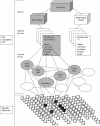Autobiographical memory specificity and emotional disorder
- PMID: 17201573
- PMCID: PMC2834574
- DOI: 10.1037/0033-2909.133.1.122
Autobiographical memory specificity and emotional disorder
Abstract
The authors review research showing that when recalling autobiographical events, many emotionally disturbed patients summarize categories of events rather than retrieving a single episode. The mechanisms underlying such overgeneral memory are examined, with a focus on M. A. Conway and C. W. Pleydell-Pearce's (2000) hierarchical search model of personal event retrieval. An elaboration of this model is proposed to account for overgeneral memory, focusing on how memory search can be affected by (a) capture and rumination processes, when mnemonic information used in retrieval activates ruminative thinking; (b) functional avoidance, when episodic material threatens to cause affective disturbance; and (c) impairment in executive capacity and control that limits an individual's ability to remain focused on retrieval in the face of distraction.
(c) 2007 APA, all rights reserved.
Figures



References
-
- Ajzen I. (1998). Attitudes, personality and behavior. Chicago: Dorsey Press.
-
- American Psychiatric Association. (1994). Diagnostic and statistical manual of mental disorders (4th ed.). Washington, DC: Author.
-
- Arntz A., Meeren M., & Wessel I. (2002). No evidence for overgeneral memories in borderline personality disorder. Behaviour Research and Therapy, 40, 1063–1068. - PubMed
-
- Baddeley A. (1996). Exploring the central executive. Quarterly Journal of Experimental Psychology: Human Experimental Psychology, 49A5–28.
-
- Baddeley A. D., Emslie H., & Nimmo-Smith I. (1992). The speed and capacity of language-processing. Bury St. Edmunds, England: Thames Valley Test Company.

